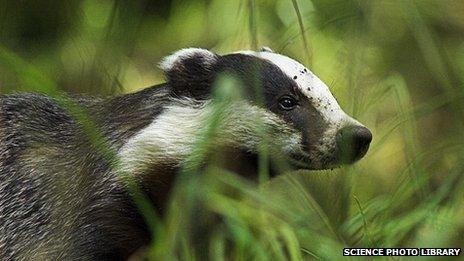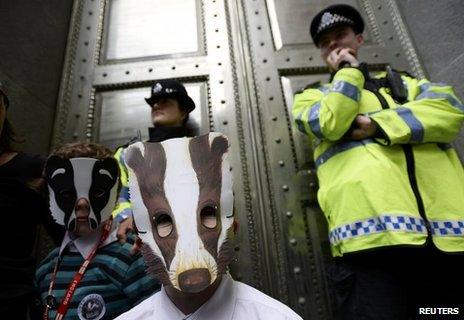Badgers: Official documents doubt cull extension
- Published

Both pilot badger culls have been extended
The Gloucestershire badger cull may not reach a target of killing 70% of badgers even after being extended, a document seen by the BBC suggests.
The culling licence will be revoked early if badger kills fall too low, says government agency Natural England.
Ultimately, only half the badger population may be removed, meaning additional culling will be needed next year, according to the analysis.
Opponents say the cull is "a huge failure" and should be stopped now.
Officials are aware that perturbation - where badgers roam further afield and cause new outbreaks of TB in cattle - is likely to have happened in the Gloucestershire cull zone. This was a factor in the decision to extend the cull.
A Natural England document seen by the BBC says the 70% target may not be achieved, even with an eight-week extension into December. A lower figure of 53% would force additional measures next year.
"If the population is not reduced by at least 70% then additional culling may be required in the second year of culling," said the analysis.
The document also reveals that if culling badgers proves too difficult in the winter months, the licence will be revoked early.
"It is recommended that the daily removal rate of badgers is monitored closely and if the rate falls below projections (such that a significant reduction in badger numbers may not be achieved) then we should consider terminating culling operations (by revoking the licence) as in this scenario there is unlikely to be a net benefit from continued culling," said the document.
Commenting on the figures, a spokesman for Natural England said: "We've given these figures based on what we consider to be realistic targets and although 540 [badgers] would give disease control benefits, we would want culling to reach the 70% target to ensure maximum disease control benefits."
Natural England was unable to comment further because the document may be subject to legal processes, he added.
Public safety
A second document seen by the BBC confirms that in the initial six-week culling period, cages for trapping badgers and thermal imaging equipment for shooting were brought in by contractors because of problems with free shooting.
In an email requesting an extension to the licence, the directors of the culling company in Gloucestershire said a number of factors had affected progress, including the need to maintain public safety and the behaviour of badgers in the cull zone.
Crops that had yet to be harvested hampered free shooting in parts of the cull zone, while badgers shunned baits in favour of maize cobs and blackberries growing in fields.
A spokesperson from the NFU said: "The NFU is not commenting on anything to do with operational matters. However, as we have said previously, there have been learning experiences as to the best way of carrying out the culls effectively throughout the operations and the knowledge learned will be essential for helping with future rollout of culls in areas where TB is rife."

The policy has sparked protests in Westminster and in the cull zones
Badger culling is taking place in west Somerset and west Gloucestershire. Both six-week pilots have been granted extensions by Natural England, after culling teams failed to reach the target of 70% of badgers.
Dominic Dyer, policy adviser for the wildlife charity Care for the Wild said the pilot badger culls were undertaken to establish the effectiveness, humaneness and safety of removing 70% of badgers from the cull areas over six weeks using free shooting of badgers at night as a killing method.
He said the information on the six-week pilot cull in Gloucestershire showed it had "proved a huge failure".
"Of the 704 badgers shot in six weeks, only 543 were free shot with the remaining 161 cage trapped," he said.
He added that in both areas - Gloucestershire and Somerset - only 23% of 2,350 badgers in the cull areas were killed by free shooting.
"Free shooting has clearly failed on a massive scale and the pilot culls should now be halted on this basis alone," he added.
A spokesperson for Defra said: "The advice of the chief vet is clear that the more badgers removed in the first year of a four [year] cull, the greater and quicker the disease reduction benefits will be. His advice also states that the benefit of removing a greater proportion of the population is likely to outweigh the effect of perturbation.
"Both cage trapping and controlled shooting have always been available to the cull companies. It is their decision how they wish to use the two methods."
The continuing controversy over culling badgers is likely to add to pressure on Environment Secretary Owen Paterson, who appears on Tuesday before the Environment, Food and Rural Affairs committee to answer questions on the policy.
Ministers and the NFU say culling is needed to control TB in cattle, but animal welfare groups say the pilot culls are a failure and should be stopped immediately.
- Published27 August 2013
- Published23 October 2013
- Published18 October 2013